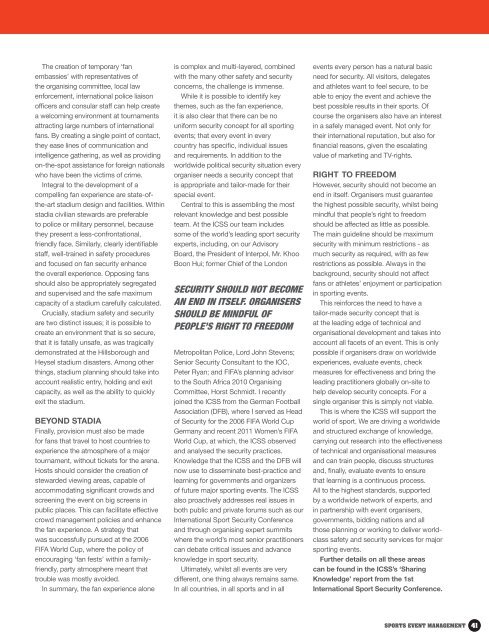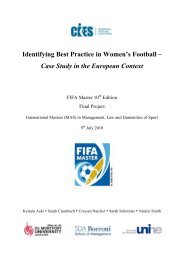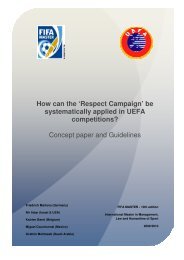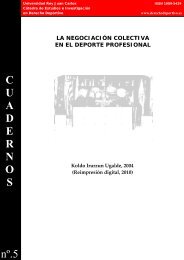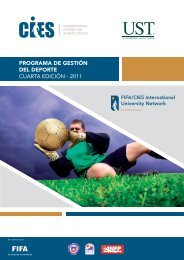sports event management - FIFA/CIES International University Network
sports event management - FIFA/CIES International University Network
sports event management - FIFA/CIES International University Network
- No tags were found...
You also want an ePaper? Increase the reach of your titles
YUMPU automatically turns print PDFs into web optimized ePapers that Google loves.
The creation of temporary ‘fanembassies’ with representatives ofthe organising committee, local lawenforcement, international police liaisonofficers and consular staff can help createa welcoming environment at tournamentsattracting large numbers of internationalfans. By creating a single point of contact,they ease lines of communication andintelligence gathering, as well as providingon-the-spot assistance for foreign nationalswho have been the victims of crime.Integral to the development of acompelling fan experience are state-ofthe-artstadium design and facilities. Withinstadia civilian stewards are preferableto police or military personnel, becausethey present a less-confrontational,friendly face. Similarly, clearly identifiablestaff, well-trained in safety proceduresand focused on fan security enhancethe overall experience. Opposing fansshould also be appropriately segregatedand supervised and the safe maximumcapacity of a stadium carefully calculated.Crucially, stadium safety and securityare two distinct issues; it is possible tocreate an environment that is so secure,that it is fatally unsafe, as was tragicallydemonstrated at the Hillsborough andHeysel stadium disasters. Among otherthings, stadium planning should take intoaccount realistic entry, holding and exitcapacity, as well as the ability to quicklyexit the stadium.BEYOND STADIAFinally, provision must also be madefor fans that travel to host countries toexperience the atmosphere of a majortournament, without tickets for the arena.Hosts should consider the creation ofstewarded viewing areas, capable ofaccommodating significant crowds andscreening the <strong>event</strong> on big screens inpublic places. This can facilitate effectivecrowd <strong>management</strong> policies and enhancethe fan experience. A strategy thatwas successfully pursued at the 2006<strong>FIFA</strong> World Cup, where the policy ofencouraging ‘fan fests’ within a familyfriendly,party atmosphere meant thattrouble was mostly avoided.In summary, the fan experience aloneis complex and multi-layered, combinedwith the many other safety and securityconcerns, the challenge is immense.While it is possible to identify keythemes, such as the fan experience,it is also clear that there can be nouniform security concept for all sporting<strong>event</strong>s; that every <strong>event</strong> in everycountry has specific, individual issuesand requirements. In addition to theworldwide political security situation everyorganiser needs a security concept thatis appropriate and tailor-made for theirspecial <strong>event</strong>.Central to this is assembling the mostrelevant knowledge and best possibleteam. At the ICSS our team includessome of the world’s leading sport securityexperts, including, on our AdvisoryBoard, the President of Interpol, Mr. KhooBoon Hui; former Chief of the LondonSECURITY SHOULD NOT BECOMEAN END IN ITSELF. ORGANISERSSHOULD BE MINDFUL OFPEOPLE’S RIGHT TO FREEDOMMetropolitan Police, Lord John Stevens;Senior Security Consultant to the IOC,Peter Ryan; and fifa’s planning advisorto the South Africa 2010 OrganisingCommittee, Horst Schmidt. I recentlyjoined the ICSS from the German FootballAssociation (DFB), where I served as Headof Security for the 2006 fifa World CupGermany and recent 2011 Women’s fifaWorld Cup, at which, the ICSS observedand analysed the security practices.Knowledge that the ICSS and the DFB willnow use to disseminate best-practice andlearning for governments and organizersof future major sporting <strong>event</strong>s. The ICSSalso proactively addresses real issues inboth public and private forums such as our<strong>International</strong> Sport Security Conferenceand through organising expert summitswhere the world’s most senior practitionerscan debate critical issues and advanceknowledge in sport security.Ultimately, whilst all <strong>event</strong>s are verydifferent, one thing always remains same.In all countries, in all <strong>sports</strong> and in all<strong>event</strong>s every person has a natural basicneed for security. All visitors, delegatesand athletes want to feel secure, to beable to enjoy the <strong>event</strong> and achieve thebest possible results in their <strong>sports</strong>. Ofcourse the organisers also have an interestin a safely managed <strong>event</strong>. Not only fortheir international reputation, but also forfinancial reasons, given the escalatingvalue of marketing and TV-rights.RIGHT TO FREEDOMHowever, security should not become anend in itself. Organisers must guaranteethe highest possible security, whilst beingmindful that people’s right to freedomshould be affected as little as possible.The main guideline should be maximumsecurity with minimum restrictions - asmuch security as required, with as fewrestrictions as possible. Always in thebackground, security should not affectfans or athletes’ enjoyment or participationin sporting <strong>event</strong>s.This reinforces the need to have atailor-made security concept that isat the leading edge of technical andorganisational development and takes intoaccount all facets of an <strong>event</strong>. This is onlypossible if organisers draw on worldwideexperiences, evaluate <strong>event</strong>s, checkmeasures for effectiveness and bring theleading practitioners globally on-site tohelp develop security concepts. For asingle organiser this is simply not viable.This is where the ICSS will support theworld of sport. We are driving a worldwideand structured exchange of knowledge,carrying out research into the effectivenessof technical and organisational measuresand can train people, discuss structuresand, finally, evaluate <strong>event</strong>s to ensurethat learning is a continuous process.All to the highest standards, supportedby a worldwide network of experts, andin partnership with <strong>event</strong> organisers,governments, bidding nations and allthose planning or working to deliver worldclasssafety and security services for majorsporting <strong>event</strong>s.Further details on all these areascan be found in the ICSS’s ‘SharingKnowledge’ report from the 1st<strong>International</strong> Sport Security Conference.SPORTS EVENT MANAGEMENT 41


